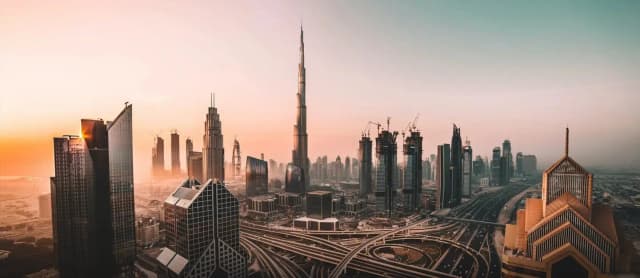Dubai’s real estate market has long been a magnet for international investors, attracting buyers from all over the world due to its tax advantages, high returns, and a wide range of property options. In recent years, joint ownership of properties in Dubai has become an increasingly popular investment strategy for both local and foreign buyers. Whether you’re looking to buy a home with a family member, friend, business partner, or investor group, joint property ownership offers numerous advantages, as well as some challenges, to consider.
In this blog, we will take an in-depth look at joint ownership of properties in Dubai, covering its key benefits, types of ownership structures, the legal framework, and important considerations that potential co-owners should keep in mind.
What is Joint Ownership of Property?
Joint ownership refers to the situation where two or more parties collectively own a property. The parties share the rights and responsibilities associated with the property, including financial obligations such as mortgage payments, property taxes, and maintenance costs. In Dubai, joint ownership can apply to both residential and commercial properties.
Joint ownership allows investors to pool their resources to purchase a property they might not be able to afford individually. It also spreads the financial risk, especially in a market that may experience fluctuations. However, this type of ownership comes with its own set of legal and operational requirements that must be carefully understood before entering into an agreement.
Types of Joint Ownership Structures in Dubai
In Dubai, joint ownership can take various forms, each with its own set of legal and financial implications. Some of the most common types of joint ownership include:
1. Joint Tenancy (With Right of Survivorship)
Under a joint tenancy agreement, two or more people co-own the property and have equal rights to it. One of the key features of this structure is the “right of survivorship,” meaning that if one of the owners passes away, their share of the property automatically transfers to the surviving co-owners, without the need for probate. This form of ownership is often preferred by family members or close partners who want to ensure that their share of the property is passed on directly to the remaining co-owners.
This type of joint ownership is less common in Dubai, where ownership rules are often dictated by the Emirate’s legal framework for foreign property buyers and residents.
2. Tenancy in Common
Tenancy in common allows two or more individuals to own a property together, but each person’s share can be unequal. For example, one person may own 60% of the property, while another owns 40%. This structure is more flexible than joint tenancy because it allows owners to decide how much of the property they want to own.
One of the advantages of tenancy in common is that each co-owner can transfer or sell their share of the property independently, without the consent of the other owners. In the event of the death of one of the co-owners, their share of the property is passed to their heirs or beneficiaries, rather than to the surviving co-owners.
3. Co-ownership by Corporate Entities
Another popular structure in Dubai is co-ownership through a corporate entity. This is often the preferred option for investors or business partners who wish to jointly invest in a property but prefer to do so under the umbrella of a legal entity (e.g., a Limited Liability Company, or LLC). In this structure, the property is owned by the corporate entity, and the shareholders (co-owners) hold stakes in the company.
Co-ownership by corporate entities is more common among foreign investors, as it provides a legal framework to manage property rights, including taxation and potential issues related to inheritance. This type of ownership can also provide certain protections under Dubai’s commercial laws, which are less complex and more streamlined than personal property laws.
4. Shared Ownership Programs (Fractional Ownership)
Fractional ownership is another option for co-owning property, typically in luxury developments or high-end vacation homes. In fractional ownership, each investor owns a “share” of the property, usually in the form of a fixed number of days or weeks per year. This is ideal for individuals who want to use the property for vacation purposes or as an investment that generates rental income.
Dubai has seen the rise of fractional ownership schemes, particularly in luxury residential areas such as Palm Jumeirah and Dubai Marina, where investors pool their resources to co-own premium properties. The main appeal of fractional ownership lies in its flexibility, allowing multiple parties to share the costs and responsibilities associated with owning a high-value asset.
Legal Framework for Joint Property Ownership in Dubai
Dubai has a well-defined legal structure for property ownership, particularly for foreign investors. The regulatory framework provides clarity on how joint ownership is handled, especially for non-UAE nationals who are looking to invest in Dubai’s real estate market. Here are some key aspects of the legal framework for joint property ownership in Dubai:
1. Property Ownership for Non-UAE Nationals
Foreign nationals are allowed to buy property in designated freehold areas of Dubai, which include high-demand locations such as Downtown Dubai, Palm Jumeirah, and Dubai Marina. Joint ownership by foreign investors is permitted in these areas, but certain legal stipulations must be adhered to. For example, foreign co-owners can hold the title deed through a local partner or establish a legal entity such as an LLC to hold the property.
It’s important to note that foreign investors can only purchase property in designated freehold areas. In non-freehold areas, joint ownership might not be permissible unless the property is designated for leasehold ownership.
2. Title Deeds and Registration
For any joint ownership arrangement, the property title deed must be registered with the Dubai Land Department (DLD), which is the government authority responsible for all property transactions in the emirate. The DLD ensures that the ownership details of all parties involved are officially documented and legally recognized. Both joint tenants and tenants in common must register their shares with the DLD, making the process transparent and legally enforceable.
3. Inheritance Laws and Succession Planning
It’s crucial for joint property owners in Dubai to have clear agreements in place regarding the succession of property ownership in the event of one of the co-owners passing away. The legal framework governing inheritance in Dubai can differ based on the nationality of the property owners. For example, UAE nationals are subject to Sharia law, while expatriates may follow their home country’s laws.
To avoid complications, it’s advisable for joint owners to have a will in place that clearly outlines what happens to their share of the property in case of death. The introduction of Dubai’s Probate Court in 2020 has made the process of inheritance and succession more transparent for foreign nationals living in Dubai.
4. Financial Considerations and Mortgages
Joint owners of property in Dubai can apply for a mortgage through local banks, although financing terms may differ depending on the type of ownership and the relationship between co-owners. The mortgage application process will involve a thorough review of the financial status of each co-owner, and the bank will typically require each individual co-owner to be listed as a guarantor.
It’s also important for joint owners to have a clear understanding of their share of the financial responsibility for the property. This includes not only the mortgage payments but also recurring costs such as property management fees, insurance, and utilities.
Benefits of Joint Property Ownership in Dubai
Shared Financial Risk: One of the main benefits of joint property ownership is that the financial risk is shared. By pooling resources, co-owners can invest in more expensive properties or reduce their personal financial burden.
Affordability: Joint ownership allows individuals to invest in Dubai’s thriving real estate market without having to commit all of their personal savings, making it an attractive option for investors with limited capital.
Asset Diversification: Joint ownership offers an opportunity for individuals to diversify their investment portfolios by owning real estate in a global investment hub like Dubai.
Increased Investment Potential: By combining funds, joint owners can access a wider range of properties, including high-value or luxury developments that they might not otherwise afford individually.
Challenges and Considerations
Disagreements Between Co-Owners: One of the most common challenges in joint property ownership is potential disagreements regarding property management, usage, or financial obligations. Clear, written agreements can mitigate this risk.
Exit Strategy: If one co-owner wants to sell their share, they must first offer it to the other co-owners. This can lead to challenges in finding buyers or agreeing on sale prices.
Legal and Succession Complexities: Without proper legal arrangements, joint owners can face complications in the event of death or separation, particularly in a multi-national environment like Dubai.
Conclusion
Joint ownership of property in Dubai offers a range of benefits, from shared financial risk to increased investment opportunities. However, it is crucial for co-owners to establish clear legal agreements and understand the regulatory framework governing property ownership in Dubai. Whether you are a local investor or a foreign national, exploring joint ownership in Dubai can be a highly rewarding venture when approached with the right knowledge and planning.






